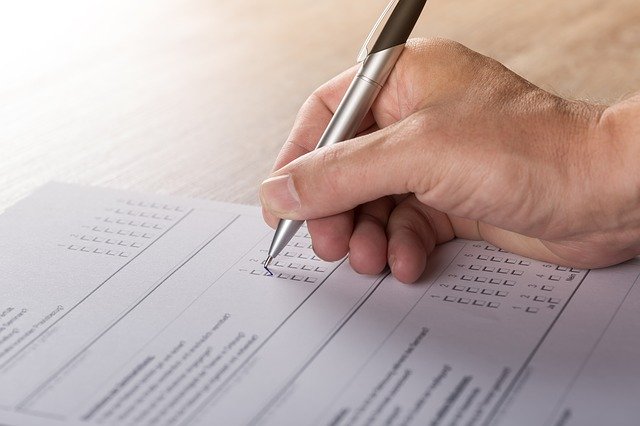Law School Final Exam Tips From The #1 Law Student
If you are looking for the best law school final exam tips, it makes sense to get them from the student that graduated #1! So, here we give you ten important law school final exam tips from the #1 law student.
Law School Final Exam Tips From The #1 Law Student
Tip 1: Outline as soon as possible with a sharp focus on your class notes.
Do not delay in creating your outline! At this point, if you have not started outlining, remember to sharply focus on the black letter law found in your class notes.
Why class notes? Your professor writes your exam so you want to focus on what he or she has said during class.
Why rules? Because this is what you’ll have to know for exam day. Do not include cases or hypos if you are outlining late. Time is of the essence, so you want to include what is most important for you to memorize!
Learn our best outlining tips here.
Tip 2: Commit to actively reviewing your outlines.
An important thing to keep in mind is that you actually have to know the law to excel on a law school exam. Even if you have an open-book exam, you will not have enough time to look up all of the rules that you will be expected to state on exam day. So make learning the law a priority.
The first way to do this is to make sure you understand the law. If you do not understand it, you will have a hard time memorizing it (let alone applying it). You can sign up for a law school tutoring session with us if you would like a law school tutor to teach you what you need to know to excel!
Then you have to learn the law.
In a nutshell, the best way to do this is the following:
- Do it at your best time of day. For a lot of people, this is the morning and involves a big pot of coffee brewing!
- Take breaks. Commit to memorizing for 30-45 minutes at a time and take 5 or 10 minute breaks
- Don’t passively read your outline. Don’t mindlessly rewrite your outline. Don’t make flashcards (for the most part — it takes a lot of time)
- Use active techniques like quizzing yourself by seeing if you can rewrite, say, all of the torts and all of their elements. Keep doing it until you get them all!
Learn tips on memorizing your outlines here.
Tip 3: Stop looking at your casebook.
Your casebook really has no purpose at this point. You should simply put it away. Right now, you want to focus on your class notes.
Reading cases will not help you. Briefing cases will not help you.
Outlining and learning your outline will.
Tip 4: Go the extra mile and memorize a few case names.
If you want to go the extra mile, memorize a few case names — particularly the most important, seminal case names. Like Palsgraff or International Shoe. Being able to state these names in your final exam will impress the professor.
Tip 5: Practice exams!
There is an easy way for me to know which students are getting an “A” on the final exam and which students are getting “B”s. I ask, “are you practicing exams?” If the answer is no, they will be a “B” student (or worse). If the answer is yes, they have a good shot at being an “A” student. So learn how to use IRAC and practice it.
To get a “B” on a law school final exam, you have to outline, know your outline fairly well, and have some ability to critically think (which you probably do or you would not be in law school!)
To get an “A” on a law school final exam, you have to go the extra step and practice a ton of exams. Preferably your professor’s exams. That brings us to the next point.
Tip 6: Get your professor’s exam (or at the very least, the format)
Your professor writes your exam. Your professor grades your exam. Your professor is not reinventing the wheel every semester. Instead, the exam you take will likely look a lot like exams your professor has given in the past. Get a hold of as many exams as possible! This is the absolute most important tip of all of our law school final exam tips!
If you cannot locate any past exams, make sure you are aware of the format (one long essay question, many separate questions, multiple-choice, etc.). Practice the same type of question you will be given.
If your professor does not have exams for you to review (or if they do but do not have enough exams, or the exams do not have model answers to compare your answer with) check out additional exams here.
Tip 7: Use model or sample answers.
When you practice exams, don’t just write an answer and then move on. Write your answer then compare it to the model or sample answer. Ask yourself:
- Did I spot the issues?
- Did I state the rules accurately?
- Is my analysis detailed and coherent?
- Did I arrive at correct (or arguably correct) conclusions?
This way, you will see yourself improving through practice.
Tip 8: Remember to connect the dots.
When you are writing a law school exam answer, do not skip any steps. Connect every dot for your professor. If you are answering a question on negligence and the issue is actual causation, don’t jump right into that issue. Instead, lay the groundwork. Talk about duty, breach, cause, and harm. Give an overview of the bigger picture. You will be missing out on easy points if you don’t.
If the question tests an exception to the rule, state the general rule first, then state the exception. Pretend you are writing for someone who doesn’t know the law. You will maximize your points this way.
Tip 9: Don’t repeat facts, change facts, or ignore facts.
Common mistakes that law students make involve:
- repeating all the facts at the beginning of an essay (don’t do this, your professor wrote the exam — they know the facts!)
- changing facts (“If Bob had done XYZ instead, then they would be liable for…” — don’t do this! You are wasting time and not getting any points!)
- ignoring facts (they don’t read the facts closely enough so they miss out on large issues)
The best way to avoid these errors is to see law school final exam tip #5 — practice exams! As you practice, you will notice and fix these errors. (You can also sign up for a law school tutoring session with us if you would like an expert to review your essay answer.)
Tip 10: Get ready for exam day.
There are a few things you can do to save a lot of time on exam day:
- If you have an open book exam, tabbing your outline so it is easy to find the rules is crucial. You do NOT want to be trying to find something in your outline on exam day. That is wasting valuable time.
- Write out a “cheat sheet” of rules. For example, you may want to make a cheat sheet of all the rules that go with contract formation (offer, acceptance, consideration, etc.)
- Get physically ready. If you are taking the exam at home, get your space ready. If you are going into your law school, pack a bag (sweater, ear plugs, water, snacks, etc.).
Good luck! We hope you found these law school final exam tips helpful!
Seeking Success in Law School?
- Benefit from personalized one-on-one tutoring by our seasoned law school tutors.
- Explore our NEW and highly acclaimed law school study aids, available for a free trial.







Leave a Reply
Want to join the discussion?Feel free to contribute!